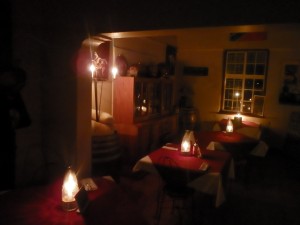June 21st.
We had left Oudtshoorn much later than we wanted, and the road was gorgeous – in farm country at the foot of a superlatively beautiful range of mountains – and so we were stopping constantly to get out and enjoy views. Night fell and it became time to look for a place to stay. We passed through a town which we thought was so poor it didn’t even have electricity – there were almost no lights at all. The people seemed to have night vision – they were walking through the streets without flashlights or streetlights. Then we passed into the next town, Swellendam: it too had no streetlights. We saw a restaurant, with a little bonfire out in front, and candles in the windows. We got out to ask directions – our guide book listed a place to stay there in town, and we needed help finding it. We also needed dinner.
As we got out of the car, and saw that in fact this was not just mood lighting, but in fact the restaurant appeared to be operating without electricity, it suddenly struck us that something was wrong. This was a blackout! And so it was. But it was a scheduled blackout – the country’s electric grid is in such peril that now there are mandatory rolling two-hour blackouts in certain areas, called “load sharing.” Even in Cape Town, we learned: at major banks and large corporate office towers, people will be working late and whoosh, oh it must be six o’clock, there goes the power. After years proclaiming that there are no problems, apparently now there was a recent admission that in fact the situation is so bad that a complete failure of the grid is not out of the question. As with all things here it then becomes a race problem: the whites note that this never happened during apartheid when they were in charge, and blame it on politically correct incompetency being valued over actual skills: government sectors in particular, such as utilities, have seen purges of white staff, who necessarily had a monopoly on training and experience during the apartheid years. My outsider perspective is this: Mandela was elected in 1994. It’s been twenty-one years now. Things need to be in order enough for the electric grid to function. South Africa is rich in coal, and in addition it has nuclear capability (one plant operating, more could be built), and is rich in wind and solar possibilities as well.
Anyway, we got directions to our chosen guesthouse by candlelight at the restaurant, and then we went off to find it, and find it we did, though with some difficulty, signs not being visible in the night. The proprietor of the place showed us to our room by candlelight, and everything was magical about it all. The house is an 18th century Dutch house, with thick stone walls and yellowwood floors, and our room has a big clawfoot tub and old furniture and is just lovely by candlelight. Even just approaching it, through the old formal hedges up the walk, with no light but the candles in the windows, is incredible. After dropping off our bags we returned to the restaurant, which was itself really a large old house, and where we ate by candlelight as the waiter strolled through the dark rooms. It was amazing, it was beautiful, it was another crazy adventure. It was also incredibly quiet. As usual there was no one in the restaurant, and we had the place to ourselves, having more fabulous local wines and having dessert and in general having a blast.
And then, as our long dinner dragged on into the African winter night, suddenly the lights came on: the coffee machine lurched on, the refrigerators started whirring, and all the normal background noises returned. The radio came on, right in the middle of Boston’s “More Than A Feeling.” We felt like something had been taken from us. We had the waiter turn the lights off, but the loss of the silence could not be repaired.
Now back at our guesthouse, the Cypress Cottage, in the tub. Just about to finish Out of Africa. This is turning out to be a most interesting and enjoyable honeymoon.

One Comment